Could you use some fluids right now? If you're already thirsty, chances are you're dehydrated. Most Americans do not get the amount of fluids they need to function optimally. Up to three-fourths of Americans are chronically dehydrated. Dehydration leads to a range of uncomfortable symptoms, from headaches to tiredness. If left untreated, it can even be life-threatening. Luckily, dehydration is one of the simplest conditions to reverse.
To combat dehydration like a warrior, it helps first to understand what it is and how it works. Get the facts on the basics of dehydration and learn some rehydration tips.
What Is Dehydration?
Are you couch-bound with a cold or the flu? Did you drink too much at the wedding reception last night? Most people experience dehydration at one point or another. If you've ever fantasized about drinking a lake's worth of water, you know that dehydration is nothing to laugh about.
Dehydration is a condition caused by the loss of fluids. It occurs when you lose more liquids than you ingest. Up to 60% of the adult human body is composed of water, so it's no wonder dehydration slows us down.
Many times, we don't even know we're dehydrated. Mild dehydration may not produce any noticeable symptoms. Severe dehydration, on the other hand, is enough to make someone feel sick. Any form of dehydration is not ideal for your body and health.
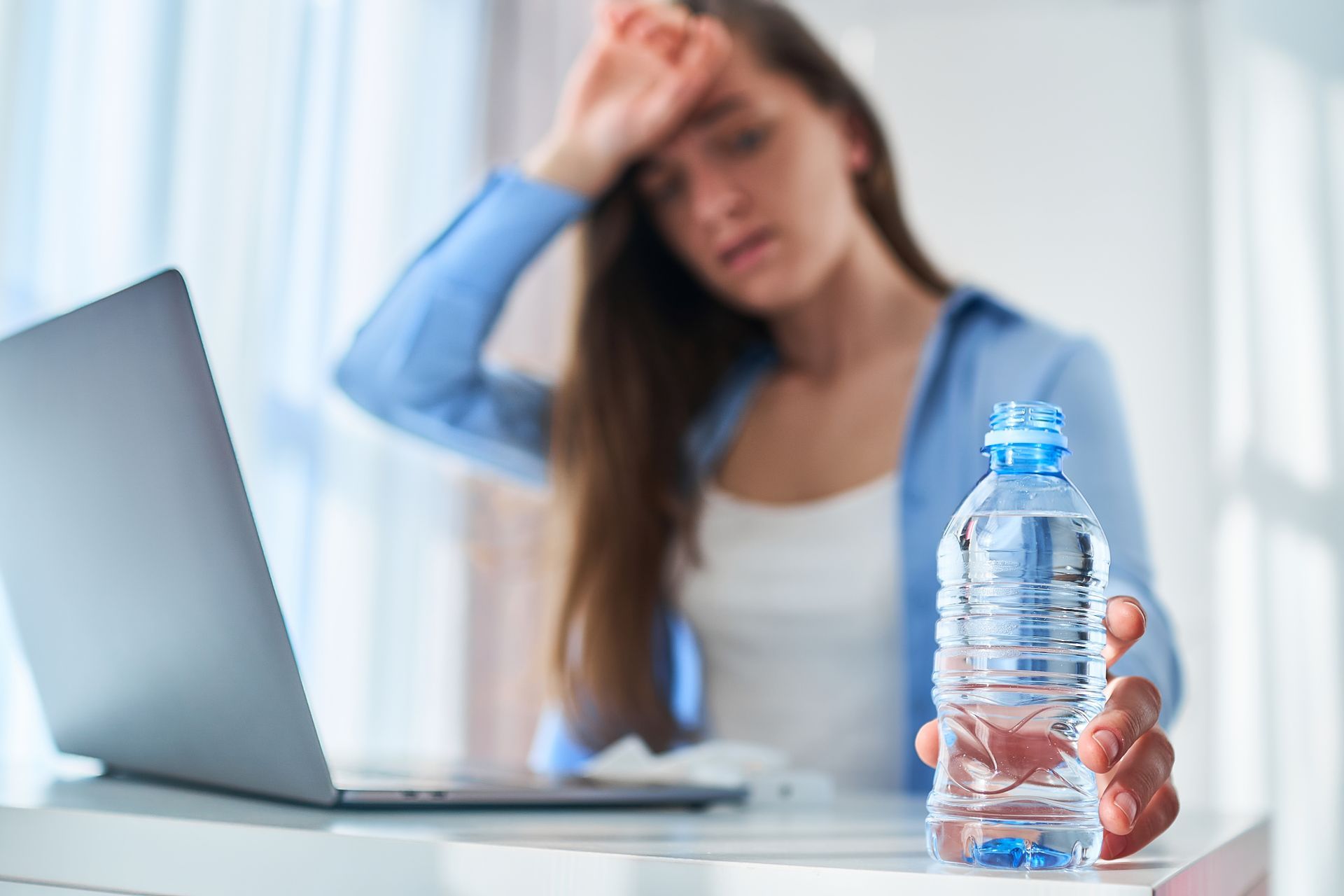
What Causes Dehydration?
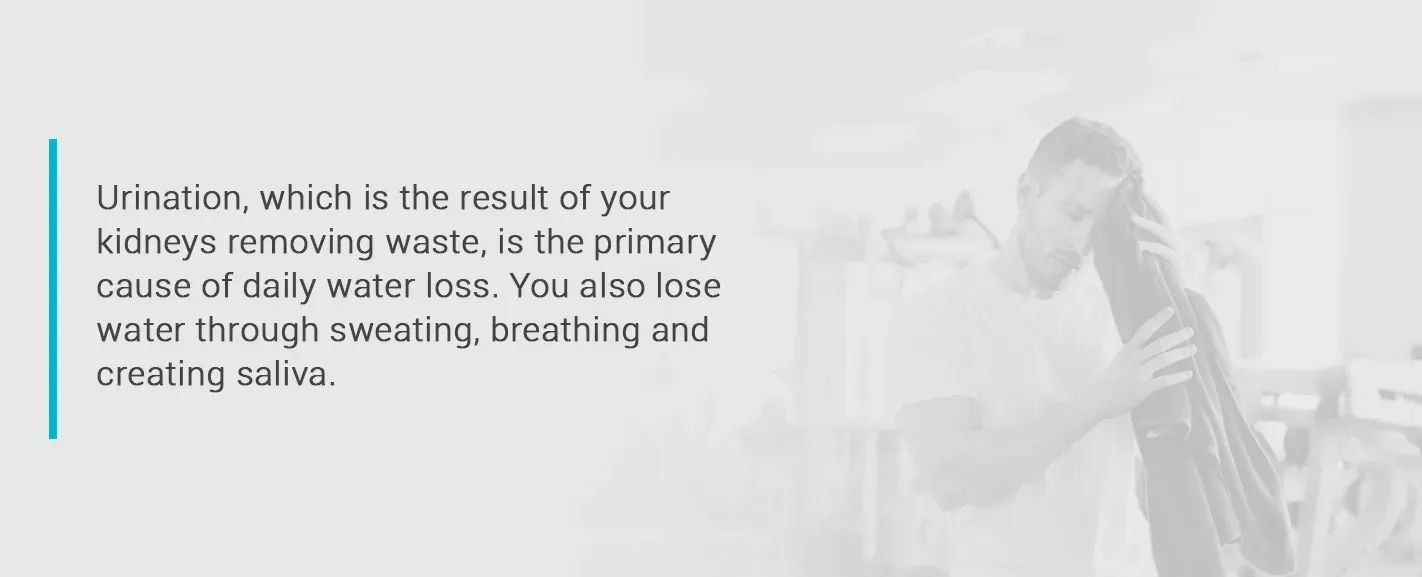
Every day, your body naturally loses water. Urination, which is the result of your kidneys removing waste, is the primary cause
of daily water loss. You also lose water through sweating, breathing and creating saliva. Here's an overview of the average water loss adults experience naturally every day:
- Breathing:
Have you ever breathed on a pair of glasses to clean it with the moisture? Our breath contains water vapor, so when you breathe, you lose water. Your body moistens your lungs as you exhale, carrying a small amount of water vapor with each exhalation. You lose about a cup of water a day simply by breathing.
- Sweating:
Every day you lose water by sweating even if you don't exercise. For example, resting in a cool room could lead to a loss of about 2 cups of water a day.
- Waste elimination:
If you eat a varied diet, you can expect to lose about 3 1/2 cups of water a day through feces and urine. This amount may increase or decrease depending on your fluid intake and diet.
Some situations, such as working out in the heat, increase water loss. When you can't keep up with the water you lose, you become dehydrated. Here are the conditions that lead to greater water loss:
- Diarrhea and vomiting:
Diarrhea alone can cause significant amounts of fluid loss, and even more if combined with vomiting. Children and elderly individuals are at greater risk of dehydration resulting from diarrhea and vomiting. In addition, children may not be able to tell you when they're thirsty or get drinks for themselves. Elderly persons who have limited mobility may also be unable to get enough water to rehydrate.
- Excessive sweating:
When you sweat, you lose water. If you do not drink enough fluids while you sweat, you'll become dehydrated. Individuals who have outdoor jobs or who exercise outside are especially at risk — more so if it's hot and humid. Humidity makes it difficult for your sweat to evaporate and cool your body down, which can increase your body temperature and need for fluids. You can lose
over a quart of water
during an hour of exercise, depending on the temperature and intensity level.
- Fever:
How many times have you been sick and not in the mood to drink anything? It may not be easy to drink enough liquids if you have a sore throat or upset stomach, but it's necessary to sip beverages at least or eat watery foods like jello or soup, particularly if you have a fever. A rise in body temperature requires you to take in more fluids.
- Increased urination:
Certain medications and diuretics, such as caffeine and alcohol, can increase urination and fluid loss. Diseases such as diabetes can lead to frequent urination and greater loss of fluids when left untreated, which may lead to dehydration.
What Are the Symptoms of Dehydration?
Anyone at any age can become dehydrated if they don't replace lost fluids. For example, if someone goes hiking during hot weather and does not drink anything, they can become dehydrated quickly, and they could even suffer from heatstroke. Even mild dehydration, or a loss of as little as
1% to 2% of your body weight, can cause you to feel unwell.
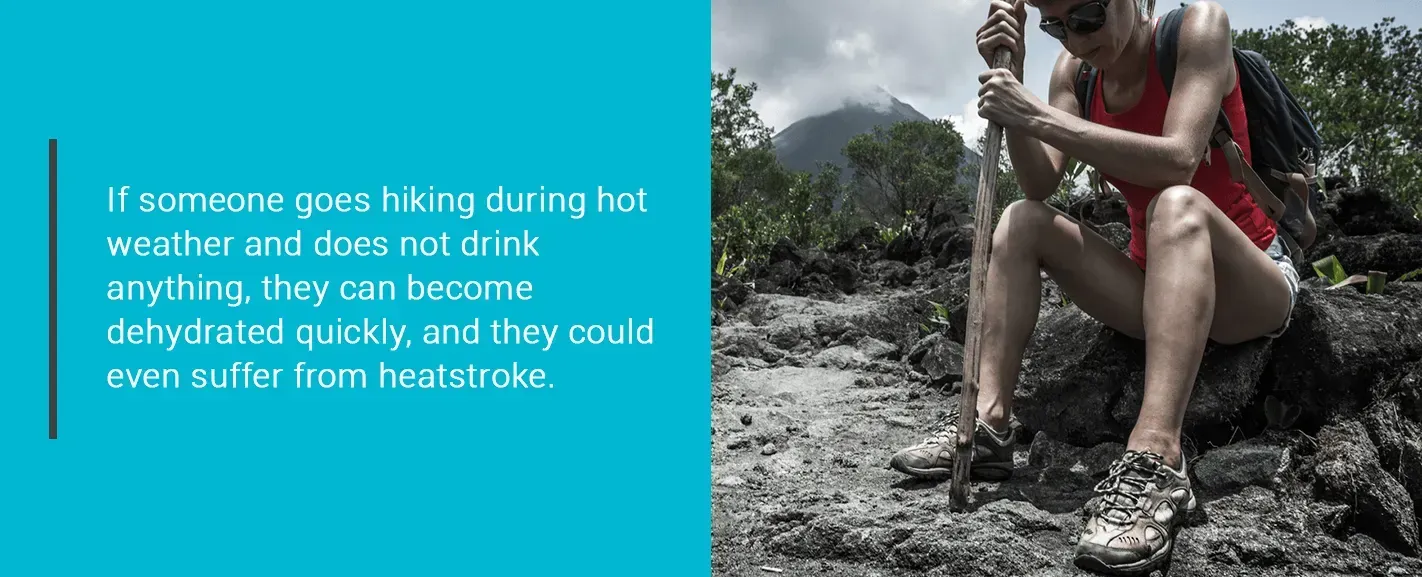
The first sign of dehydration is thirst. So, any time you find yourself racing to the refrigerator for a drink, you're already dehydrated. Other symptoms of mild dehydration
include:
- Dry mouth
- Decreased need to urinate
- Dark yellow urine
- Dry skin
-
Headache
- Muscle cramps
- Bad breath
- Constipation
-
Hunger
If you don't listen to your body's need to rehydrate, you'll eventually become severely dehydrated. Severe dehydration may produce the following symptoms:
- Light-headedness
- Fainting
- Lack of urination
- Extremely dry skin
-
Dizziness
- Rapid heartbeat and breathing
- Sunken eyes
- Confusion
- Irritability
-
Fatigue
Children with dehydration may not produce tears when they cry. Anyone who's experiencing severe dehydration requires immediate medical attention.
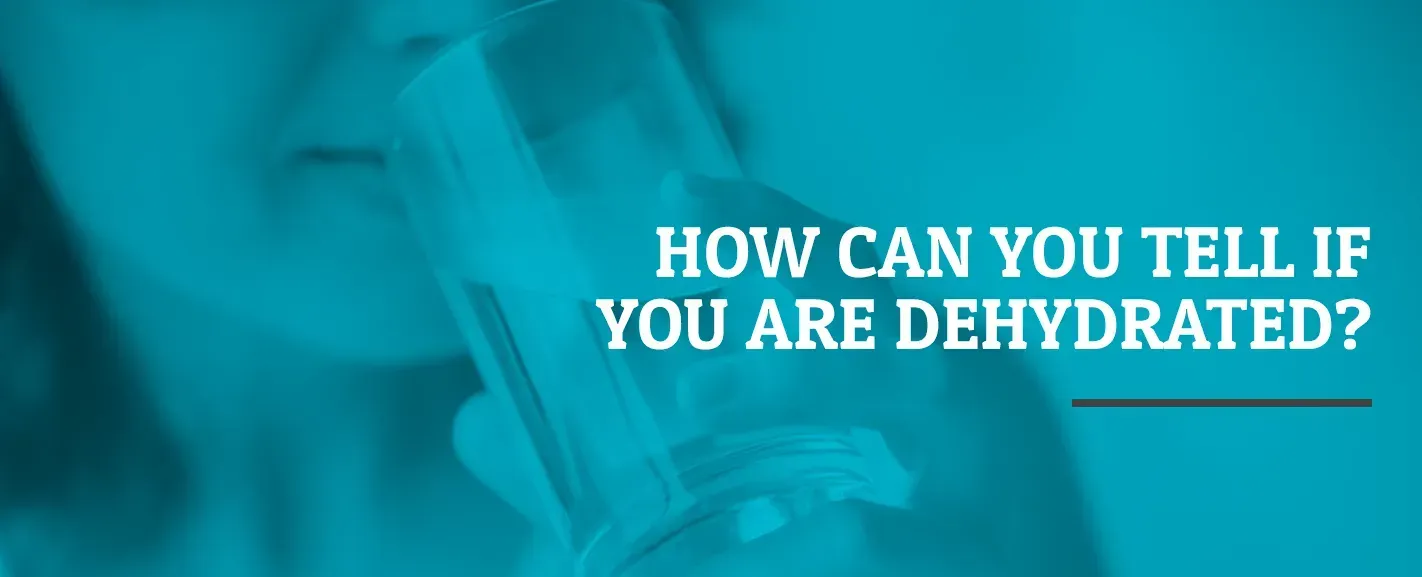
How Can You Tell If You Are Dehydrated?
Are you questioning whether or not you need to up your fluid intake? It's not always easy to tell if you have a case of mild dehydration. But, there are plenty of simple ways to test your hydration level and figure out if you're in serious need of H2O. Here are some easy methods to check for dehydration, which you can do just about anywhere.
The Skin Elasticity Test
All your body cells are made up partially of water. Your skin, in particular, is
composed of 64% water. One way to tell if you are dehydrated is to check your skin. Look for signs of dehydration such as:
- Redness
- Cracking
- Clamminess
- Tightening
-
Roughness
You can also perform a skin elasticity test. Here's how:
- Take two fingers and pinch about an inch of skin between your thumb and middle finger.
- Hold it for about three seconds — it might be a little uncomfortable, but it shouldn't hurt.
-
Let go and watch your skin settle back into place.
How long did the process take? The longer it takes, the more dehydrated you are. A well-hydrated skin system will settle back into place immediately.
Now – there is a caveat to this test. The older you are, the less elasticity your skin has, no matter how hydrated you are.
The Nail Test
You might not be able to perform the nail test if you like to paint your nails. But, if you're in-between colors, it's an easy way to test for dehydration. Here's how to perform the nail test:
- Place the testing hand above your heart.
- Press your nail until it loses color.
- Let go of your nail.
-
Count how long it takes for your nail to turn pink again.
When you press on your nail, it turns white because the pressure pushes the blood out. Usually, the blood returns in 2 seconds or less. If you're dehydrated, it'll take longer.
The Pee Test
How well could you name all the shades of yellow? Sunshine yellow, hay bale yellow, amber, honey, maybe even chartreuse? If you can't name the actual color - that's fine. You just need to understand lighter and darker to determine your hydration levels. Hydrated pee should still be yellow, but more like the pastel color of yellow you'd paint a nursery or see at Easter. It should not be clear - overhydration is a thing, too.
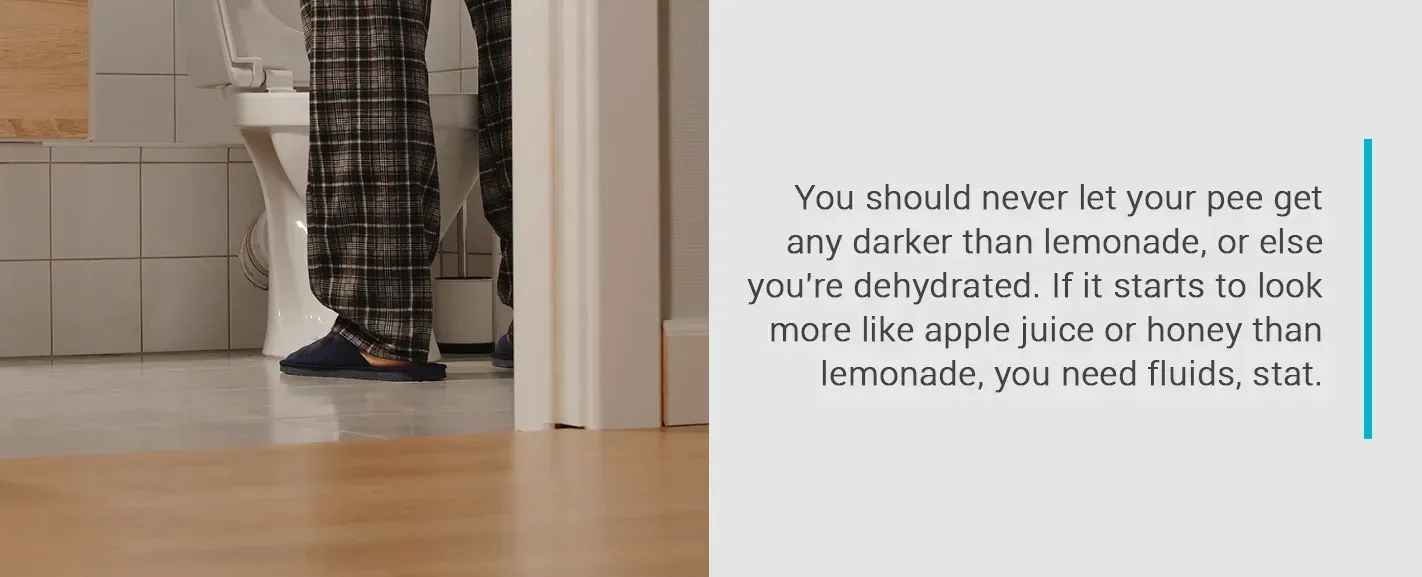
You should never let your pee get any darker than lemonade, or else you're dehydrated. If it starts to look more like apple juice or honey than lemonade - you need fluids, stat. If it's even darker than apple juice or is bloody or red, please go to urgent care or call your physician (and make sure you didn't just eat a lot of beets).
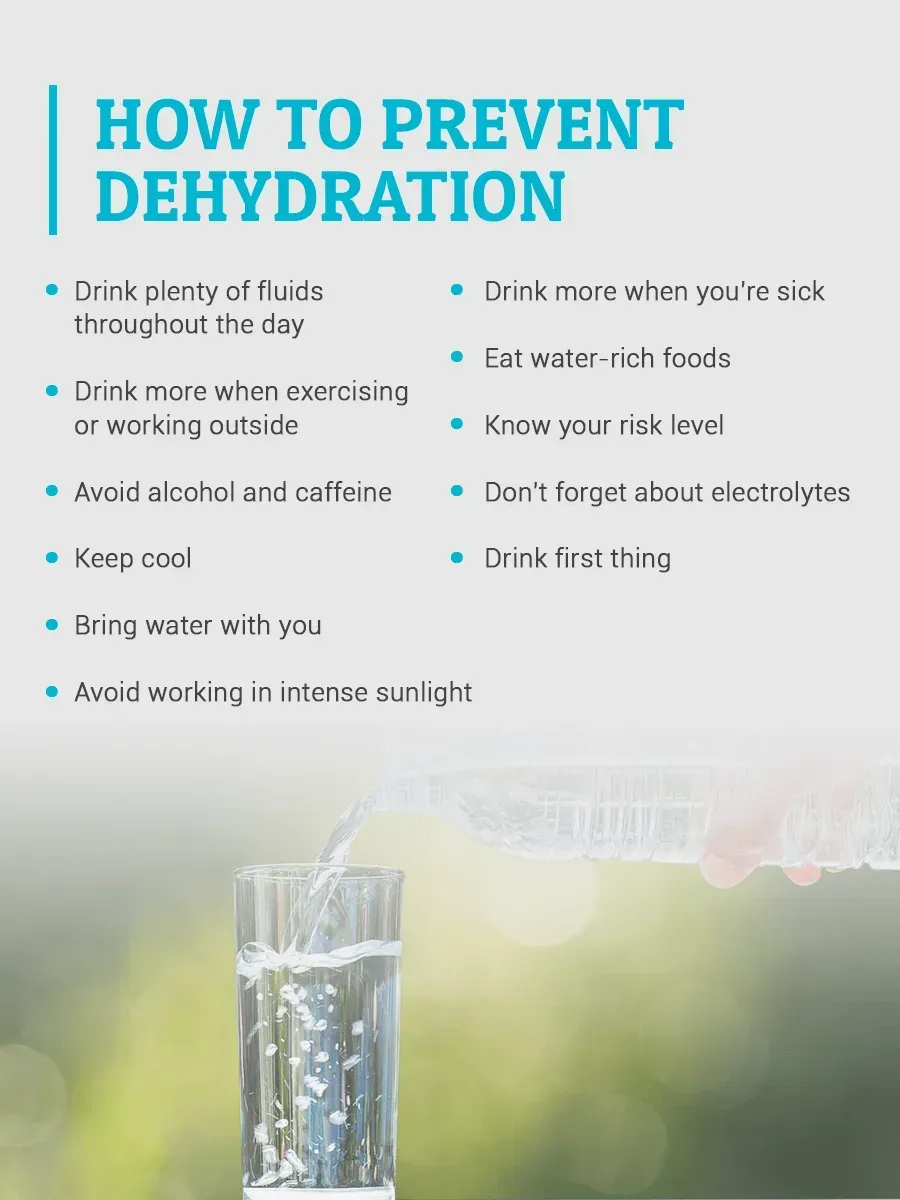
No one likes the sensation of thirst. It's your body's way of saying, "Hey, drink something already." If you're worried about dehydration, know that there are plenty of ways to keep it from happening. Here are some tips to help you beat dehydration under any circumstances:
- Drink plenty of fluids throughout the day, every day:
Don't wait until you're thirsty to drink, because by that time, you're already dehydrated. Instead, make it a habit to drink beverages all day long and not just at mealtime. If you're not a fan of plain water, that's OK. Any beverage counts. Just keep in mind that some drinks, like caffeinated soda, will send you to the bathroom more often, and you'll need to replace the lost fluid.
- Drink more when exercising or working outside:
If you work or exercise outdoors, you need to drink more than someone who stays inside. For example, someone who works outside in hot conditions should drink
between 5 and 7 ounces
of cool water or sports drinks every 15 or 20 minutes. Always drink before, during and after strenuous physical activity to replace lost fluids, whether you're indoors or outdoors. So, if you're a sports player, make sure your athletic recovery includes rehydration.
- Avoid (or at least counter) alcohol and caffeine:
We understand — sometimes it's hard to say no to happy hour. We also get that mornings can feel impossible without a cup or two of coffee. Although you don't necessarily need to skip cocktail hour at your friend's wedding, keep the following in mind: Alcoholic beverages and caffeinated drinks such as soda and coffee, increase urine output, and, therefore, fluid loss. For every alcoholic drink you have, for example, you can eliminate
up to four times as much liquid
compared to non-alcoholic drinks. Aim to drink a glass of water with every alcoholic beverage to help you stay hydrated.
- Keep cool:
One way to prevent dehydration is to stay cool and avoid excessive sweating. To do this, wear a single layer of light-colored clothing when you work or exercise outdoors. If your clothing becomes too wet with sweat, change into dry, clean clothing as soon as you can. Make sure to take breaks in the shade, and of course, drink plenty of water.
- Bring water with you:
Don't leave the house without a refillable water bottle. That way, you can ensure you have access to water while you're in school, at work or on a shopping spree. You can even challenge yourself to finish the water at different points throughout the day and before you get home. You'll feel great as a water-drinking champion.
- Avoid working in intense sunlight:
Did you know you can get dehydrated in the sun even if you do absolutely nothing? This is because your body works hard to keep you cool while you hang out in direct sunlight, and you might sweat more as a result. If you can become dehydrated merely by sitting in the sun, imagine what it's like to work. One way to prevent dehydration on a sunny day is to work outside in the early morning or late afternoon. The sun is strongest
between 10 a.m. and 2 p.m., so, if possible, work before or after those times.
- Drink more when you're sick:
If you have a cold, the flu or any other illness, make sure to increase your fluid intake. Especially drink more if you're vomiting or experiencing diarrhea to replace lost fluids, and do not wait until you're dehydrated. If your throat is sore, consider drinking warm broth or a comforting cup of decaffeinated tea. Ice pops or ice chips also help you stay hydrated when you feel too sick to move.
- Eat water-rich foods:
Did you know that staying hydrated can taste good? You just need to eat more of your favorite water-rich fruits and vegetables. Foods like watermelon, strawberries and cucumbers all
contain over 90% water.
- Know your risk level:
Although anyone can become dehydrated, some individuals like children, infants and the elderly are especially vulnerable. People who work or exercise outdoors are also at increased risk of becoming dehydrated. If a baby shows any sign of dehydration, it's critical to call a doctor immediately. Elderly individuals may be on medications that increase their dehydration risk, so they must have an easy way to obtain fluids.
-
Don't forget about electrolytes:
Sometimes, drinking water is not enough to treat dehydration. If you plan on sweating a lot or exercising for over an hour, you may need more than plain water to rehydrate and restore your electrolyte balance. Electrolytes are minerals in your body that help your heart, muscles, nerves and brain function properly. They exist in your blood, urine, tissues and other fluids. You get electrolytes, such as sodium, potassium, magnesium and calcium, from the foods and beverages you eat and drink. Low-sugar sports drinks can help you get your electrolyte levels back up during and after vigorous activities. Drinks like Pedialyte can help infants and children restore their electrolyte balance.
- Drink first thing:
If you reach for the coffee maker the moment you open your eyes, resist the urge. Give yourself a chance to rehydrate with a glass of water first. After sleeping for eight hours, you're going to wake up thirsty and dehydrated. Help your body beat dehydration before you start your day to set yourself up for success.
How Much Water Should You Be Drinking?
You may have heard that you need to drink eight glasses of water a day. This is only a general guideline. The 64-ounces-of-water-a-day model we were originally taught is only enough water if you weigh 125 pounds or less. According to
the National Center for Health Statistics, American adult men weigh about 198 pounds, and women weigh around 170 pounds on average. Other factors besides weight, such as your activity levels, affect how much you really need to drink. The point is, more often than not, eight glasses a day is usually not enough. So, how much is enough, then?
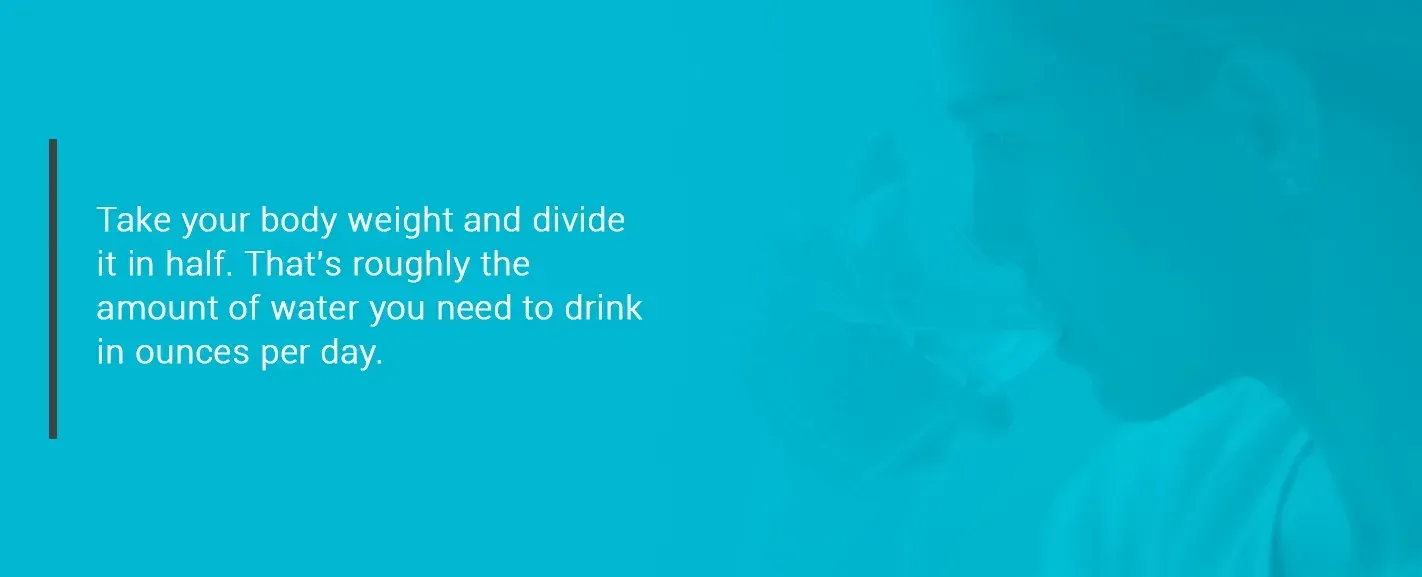
Take your body weight and divide it in half. That's roughly the amount of water you need to drink in ounces per day. If you exercise or sweat from being outside, double the amount of your regular fluid intake. Knowing that, do you get even close to the right amount of water you need per day? To be clear, if you weigh 160 pounds, you need 80 ounces of water a day to stay properly hydrated. If you're still not sure how much water you should be drinking daily, don't be afraid to reach out to your doctor and ask.
Even when you're mildly dehydrated, you might feel like you're lost in the desert. What's happening to your body when it's screaming for water? To understand what goes on when you're dehydrated, it first helps to know your body's relationship with water. To give you an idea of how important water is to your health, consider the following:
- The brain and heart are made of 73% water.
- The lungs are composed of about 83% water.
- The kidneys and muscles are made of 79% water.
- The skin contains 64% water.
-
The bones are made of 31% water.
What do all these numbers mean? Simply said, you're mostly made of water. Water helps your body:
- Form saliva.
- Regulate your internal body temperature.
- Metabolize and transport nutrients and minerals from foods into the bloodstream.
- Flush waste.
- Absorb shock.
- Lubricate joints.
- Grow new cells.
-
Deliver oxygen throughout the body
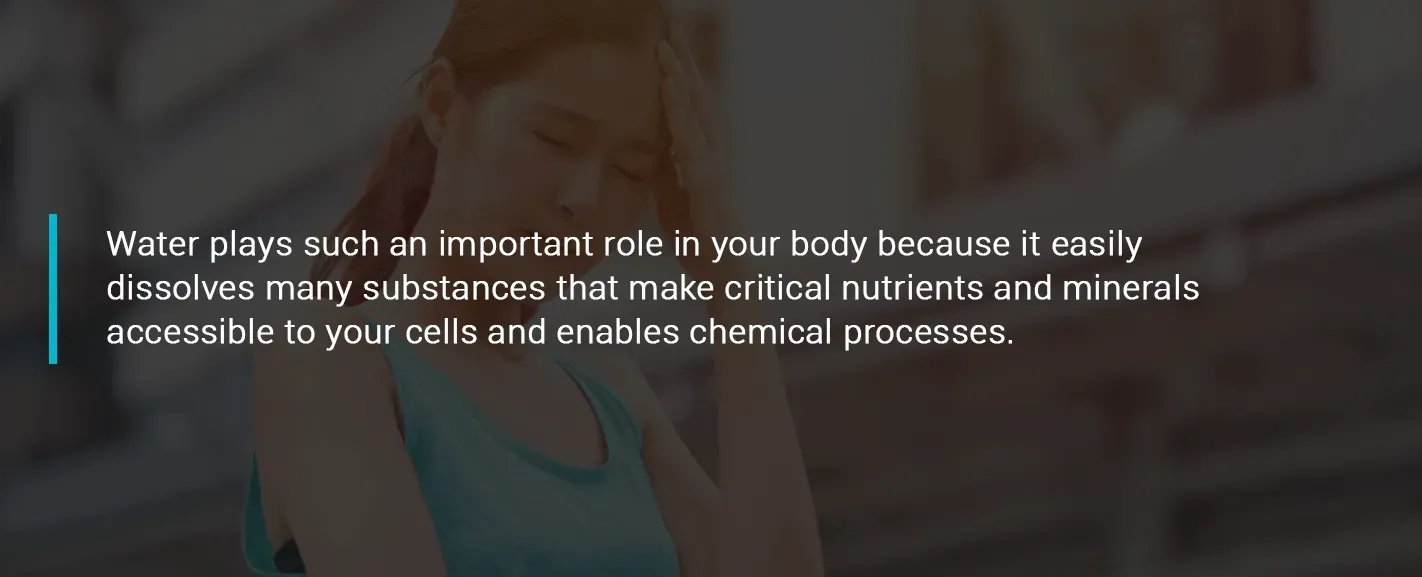
Water plays such an important role in your body because it easily dissolves many substances that make critical nutrients and minerals accessible to your cells and enables chemical processes. Also, water's "sticky" surface helps transport the proteins and carbohydrates your body uses as food and then helps eliminate waste. When you drink water, your digestive tract absorbs it for your body to use.
Think of electrolytes. Water dissolves electrolytes in your body, and the two work together to keep you healthy. To demonstrate, can you remember a time when you ate too much sodium, maybe from a salty snack? Did you feel thirsty afterward? If so, it was because your sodium level was too high. As a result, your brain sent signals to make you feel thirsty and reach for a drink. Drinking helps restore the electrolyte balance in your blood.
As you can see, your body works in surprising ways. However, it needs you to do your part and keep it hydrated. If you lose access to water or go too long without drinking, you'll likely experience the following stages of dehydration:
- Thirst:
Nerves in your brain are first stimulated and create the sensation of thirst. As your need for water increases, so does thirst. Your body is telling you to drink.
- Water conservation:
The pituitary gland in your brain secretes vasopressin, an antidiuretic hormone, so that your kidneys conserve water. As a result, you'll urinate less.
- Muscle cramps:
As dehydration progresses from mild to moderate, more water leaves your cells and moves to your blood. This leads to symptoms such as dizziness, dry mouth and muscle cramps.
- Increased heart rate:
If moderate dehydration and electrolyte imbalance are not treated, they can lead to increased heart rate, heart palpitations, decreased sweating and hypotension. Your blood will grow thicker and more concentrated the longer you stay dehydrated. This makes it harder for your heart to pump blood through your muscles and blood vessels.
If left untreated, dehydration progresses quickly. You might experience delirium, confusion, seizures, shock, and, ultimately, organ damage if you don't rehydrate.
You can treat dehydration by replacing the fluids and electrolytes you lost. The severity and cause of your dehydration, along with your age, will help you or your doctor determine the best treatment method. For example, children and infants who are dehydrated as a result of vomiting or diarrhea might take an over-the-counter rehydration solution, while older children can have diluted sports drinks. Adults with mild dehydration due to illness or drinking too much alcohol can feel better by drinking fluids.
If you're suffering from a mild case of dehydration and don't feel like running out to the grocery for sports drinks, you can concoct a home remedy. Here's a simple rehydration solution you can make at home if you have a few basic ingredients on hand:
- Mix 6 teaspoons of sugar with 1/2 teaspoon of salt and 5 cups of water.
-
Be sure the teaspoons are level and do not use too much salt.
Adults and large children can drink the solution until they feel better. If you want to improve the taste, you can add half a cup of orange juice or mashed banana. Whether you're a child or an adult, you should seek emergency medical attention if you're severely dehydrated. Severe, and sometimes moderate cases
call for a dehydration IV. Intravenous rehydration delivers fluids and salts directly through the vein. This enables a fast and effective recovery.
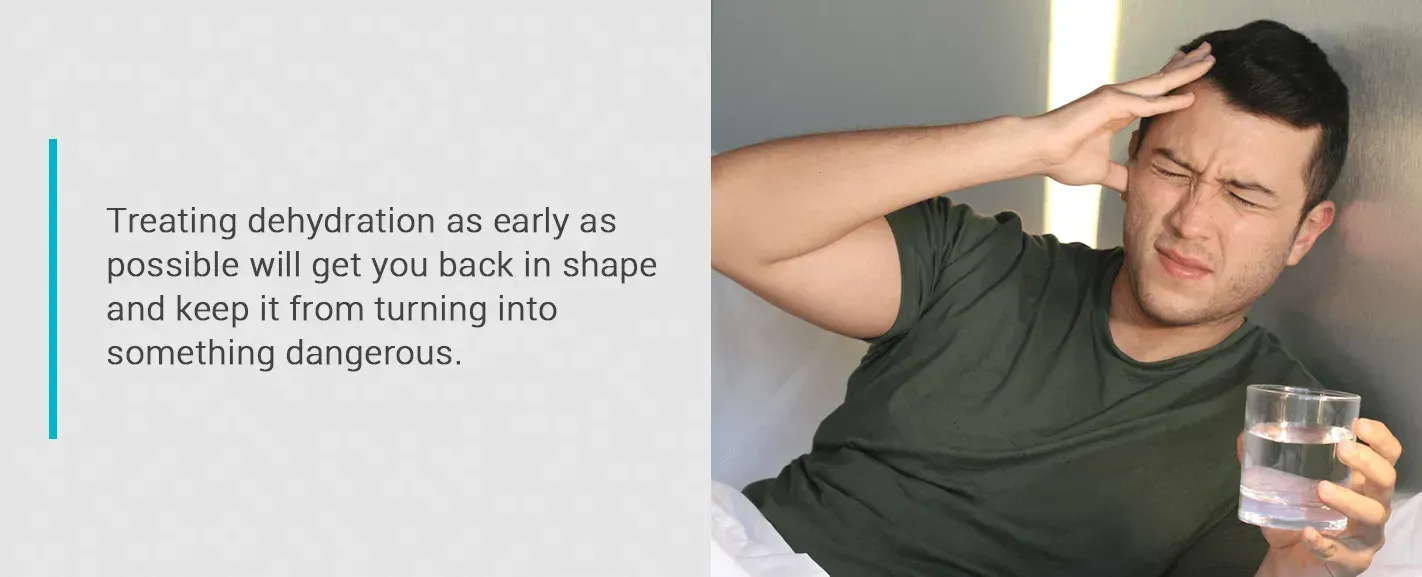
Most people in America are chronically dehydrated. If you're like the majority, there's no need to panic - you have options. Treating dehydration as early as possible will get you back in shape and keep it from turning into something dangerous.
Contact Arizona IV Medics Today
If you're dehydrated, whether it be from spending the day outdoors or suffering a hangover, AZ IV Medics can help. When you don't feel great, the last thing you want to do is wait in line at the emergency room. We bring our IV services to you so that you can rehydrate quickly and comfortably at home. Our quick procedure has you rehydrated and relieved faster than it takes to drink an adequate amount of water. Best of all, you never have to leave the couch.
You have choices when it comes to the combination of vitamins and electrolytes you want to get. What you need could be completely different from what our last patient required, or even what your partner needs. Our most popular option is the Myer's Cocktail. It's a blend of saline (salt), vitamin B, vitamin C, zinc, magnesium, and glutathione. It's the best treatment for hangovers, when you feel like you're getting sick, right after you got sick, migraines, fatigue and more.
You can look here for all the combinations of packages we offer - plus browse our range of add-ins.
Finally, did you know that being dehydrated could be the reason why you're always tired? Why it seems like coffee makes you more sleepy, instead of less? Don't let that stay your reality. Text us or give us a call at
623-521-5034, and we'll be right over with our IV mobile unit to help! You can also fill out our online contact form to reach us!
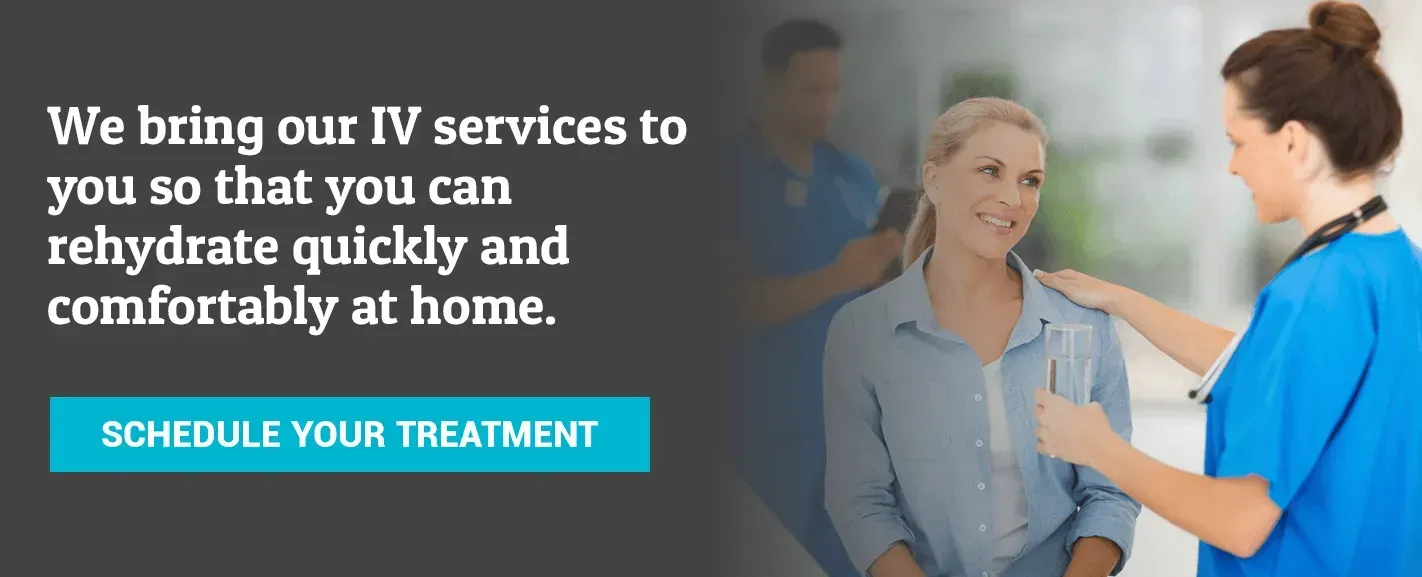
Last Reviewed By
Matt Heistan
on September 12, 2019


